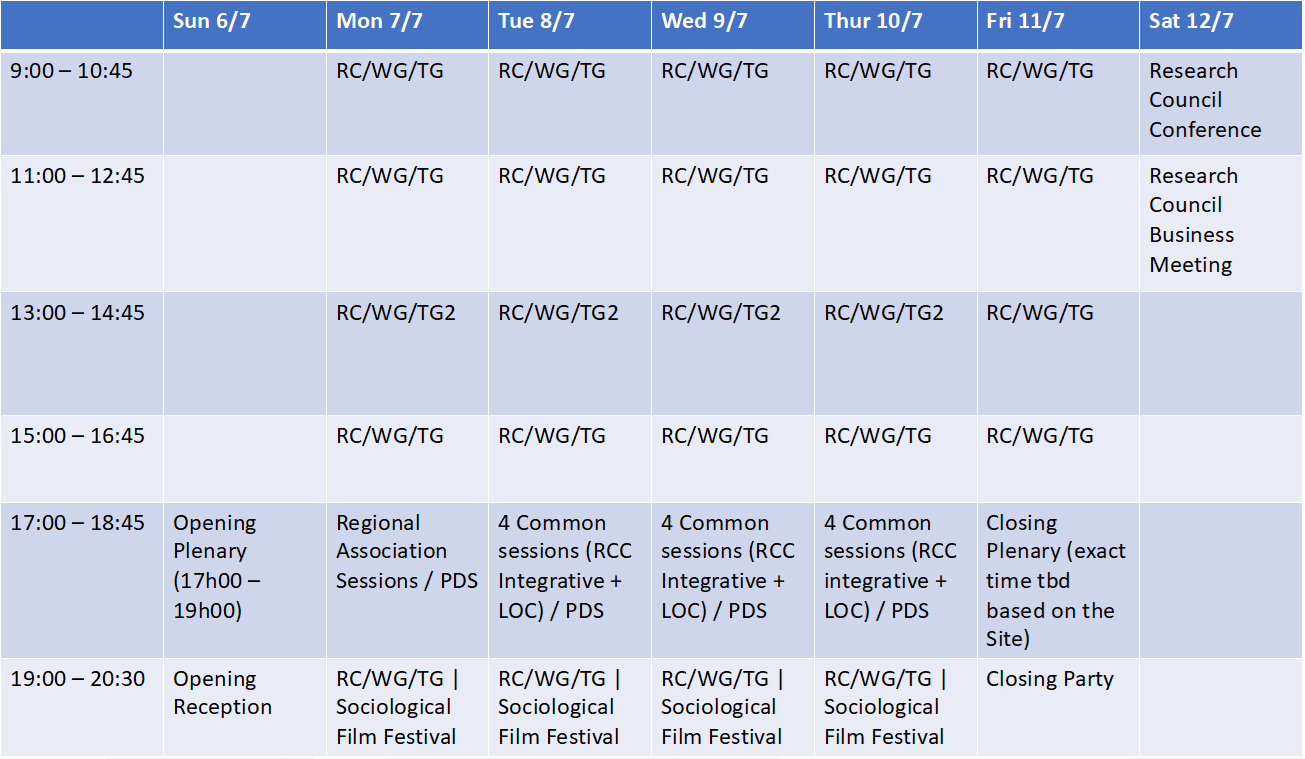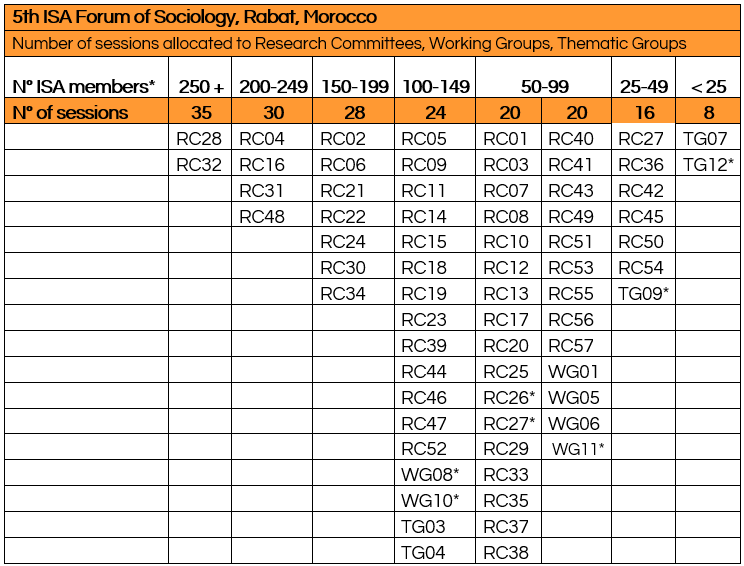5th ISA Forum of Sociology
II. Conference Format
Schedule of the sessions
- All sessions of Research Committees (RC), Working Groups (WG) and Thematic Groups (TG) will last 1 hour and 45 minutes except of an evening time-slot check 19:00-20:30 that lasts only 90 minutes. We suggest that RCs use this for the business meeting, but it is not required and RCs are free to choose which time slot they will use for their business meeting.
General Timetable

Session allocation
- The number of sessions will be allocated based on the number of ISA members in good standing in the group as of 01 May 2024, according to the scheme provided below. Members in good standing are individual members who have paid both ISA and the RC/WG/TG membership dues for the current year.
- The number of allocated sessions is the total number of all sessions assigned to RC/WG/TG, and it includes all types of sessions and a time slot for a Business Meeting.

The number of sessions allocated to RC/WG/TGs is traditionally based on the number of ISA members in good standing after the Forum or World Congress in mid-October. Due to unique circumstances, the 5th ISA Forum Guidelines for Program Coordinators set the allocation date for later, to 01 May 2024. To enable RC/WG/TG to have the largest number of sessions possible, the ISA Executive Committee decided to allocate sessions based on membership levels in either 15 October 2023 or 01 May 2024, whichever is larger. In the table above, sessions were allocated based on 15 October 2023, unless marked with an asterisk (*), in which 01 May 2024 was taken.
Type of Sessions
RC/WG/TG are encouraged to diversify the form of their sessions.
A combination of the following types of sessions is suggested:
Paper presentation session
- It is recommended that each session uses its 105 minutes to accommodate 4-5 papers and 15-20 minutes of collective discussion.
- All other papers should be listed as distributed papers in the relevant session and serve as “waitlist” for Session Organizers. These papers will be listed in the program and, providing the authors register in time, their abstracts will be included in the abstracts book. If a participant does not show up, the first participant listed under distributed papers will be asked to present a paper.
Featured or Keynote Speaker
- A session featuring a leading researcher in one of the RC/WG/TG fields, with a presentation of between 35- and 60-minutes duration, followed by a discussion period. This kind of session can attract more people from outside your group. These sessions are organized directly by Program Coordinators and/or Session Organizers and are not open for abstract submission.
Panel Session
- Panel session accommodates a larger number of invited panellists who will debate around a specific theme or on current issues of particular importance to the area of research. The floor will then be opened to the audience. Panel sessions are organized directly by Program Coordinators and/or Session Organizers and are not open for abstract submission.
Invited Session
- Sessions organized directly by Program Coordinators and/or Session Organizers. These are not open for abstract submission.
Author meets their Critics
- A debate around an important recent publication that could be presented by the author(s), with commentators and opening the floor to the audience. These sessions are organized directly by Program Coordinators and/or Session Organizers and are not open for abstract submission.
Roundtable Session
- In order to accommodate more papers, a regular session time-slot may be used for a maximum of 5 concurrent running round table presentations in one room (maximum of 5-6 presenters at each table). Five tables will be set up at the same time and in the same room. Each table will accommodate 10 persons including the presenters (suggested number of 5 presenters). Each RC/WG/TG can organize up to 1 Round Table sessions.
Poster Session
- Poster presentations of research information and results. Each RC/WG/TG can organize up to 2 Poster sessions. Each RC/WG/TG will be given a specific date/time for its Poster Session.
Joint Session
- Joint Sessions are sessions organized jointly by two or more RCs, or an RC combined with a WG or TG on a theme of overlapping interest. Please note that Joint Sessions must be included in the regular session allocation of one of the participating units. Joint sessions only count towards the session limit of the host committee. Joint sessions cannot constitute more than 50% of all sessions in which a RC/WG/TG is involved (as host and/or co-organizer).
Business Meeting
- Each RC/WG/TG is obliged to hold a Business Meeting to discuss current organizational matters as well as to conduct election, if appropriate. One of the allocated session timeslots should be used for this meeting.
Other formats
- Having a variety of types of sessions can enhance the quality of a meeting, especially if the organizers find the right people to participate in them. The above are simply suggestions. Other formats, such as a hands-on workshop, or a session on pedagogy may also be appropriate for your group.
Linguistic Diversity
Although English is the administrative language of ISA, the Association does have three official languages: English, French, and Spanish. Presentations are primarily in the official three languages. However, RC/WG/TGs are encouraged to support language diversity. If paper presentations are in languages other than English, then it is up to the RC/TG/WG to work this out creatively, given that ISA does not have funds to support simultaneous interpretation*.
Suggested possibilities:
- to have a translation of the abstract available as overheads, Power Point or distributed hard copy; for the presenter to use a mixture of English and their preferred language;
- to provide an oral sequential informal interpretation/summary by another RC member;
- to have a whispered interpretation/ summary provided by another RC member;
- to have a volunteer typing on a computer a summary of the remarks as they are made;
Most likely, there are other strategies as well. Implementing the strategies requires advanced planning, including the recruiting of qualified volunteers. It is equally important that the possibility of using such strategies also be widely known in advance, for the information of both potential paper presenters and also members of the audience and for the necessary technological devices to be available on the spot.
Conference rooms are provided with screen and computer for PowerPoint presentations.
* The Opening and Closing Ceremonies will have subtitles in English on the projected video.
